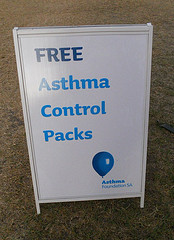
flic.kr/p/9qMECF
Asthma is a chronic inflammatory disease that makes airways (bronchial tubes) particularly sensitive to irritants, and this is characterized by breathing difficulty.
Asthma is a highly ranked chronic health condition in adults in most western countries, and it is the leading chronic illness among children.
Asthma cannot be treated, but for most patients it can be managed so that they have only minimal and infrequent symptoms and they can live an active life.
If you have asthma, controlling it is an important part of your life. Managing your asthma means staying away from things that bother your airways and taking medicines as prescribed by your doctor.
Various factors in the environment and outside of your home can be important causes or triggers for the symptoms of asthma and eventually, asthma attacks.
 |
Read how this person cured his asthma the natural way |
It is often assumed that it is better for people afflicted with asthma to live in a rural area rather than in an inner city.
Studies, however, has shown that even in the least polluted parts of the UK, such as the Scottish Highlands, the proportion of people with asthma is about the same as that elsewhere.
It seems there is no best place to live for everyone with asthma.
Living somewhere, where a person comes into contact with fewer of their triggers, is the perfect idea, and this is why it is doubly important to identify your triggers for asthma.
Some triggers can occur in any part of the country, such as cigarette smoke or viral infections, while others may vary locally, such as air quality or pollen.
In the UK, you can easily verify the local levels of air pollution by contacting the Air Pollution Information Service, run by the Department of Environment, Food & Rural Affairs (DeFRA), or on Teletext page 156.
Pollens can blow for many miles, however, for general details in the UK, contact the Pollen Research Unit.
During the summer months, you can watch for regional pollen counts in local media, or on Teletext or television or radio weather forecasts.
For a lot of people, the location of their house may be a trigger factor. People whose triggers are linked to damp, such as house-dust mite droppings or mould spores should avoid housing with signs of damp or near overground or underground rivers or canals.
Some people worry that living close to an agricultural or industrial site such as a quarry, power station or chicken farm could be a trigger for their asthma, but published research on effects on local communities from local industry emissions is limited, making it difficult to obtain detailed information.
Most of us spend a large part of our lives inside our homes, therefore, the effects of the indoor environment on our health are much more important than the effects of outdoor air pollutants.
Tagged with: asthma prevention • asthma relief
Filed under: Asthma